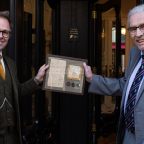
Survivors of child sexual abuse invited to share views on access to records in Exeter
Survivors of child sexual abuse who have struggled to access their childhood records are being invited to speak to the Independent Inquiry into Child Sexual Abuse in Exeter on 21 November.
The Inquiry’s Victims and Survivors Forum is holding a series of events across England and Wales to discuss barriers to accessing records and what needs to be improved in the future.
Many survivors have also told the Inquiry’s Truth Project about the difficulties they have faced trying to access medical, care and social services records, with records hidden or doctored.
For example, Phoebe was taken into care in her mid teens, where she was preyed on by an older man who abused her and forced her into sex work. She has since made a complaint to the local authority and social services regulator but has been unable to get her social services records.
Katie says that inaccurate labels about her in her care file, such as ‘promiscuous’, stigmatised her and identified her as vulnerable. She has applied for her full care records many times but has been ignored.
The Inquiry recently published a report on residential care from its Truth Project. Survivors have recommended less red tape and easier access to information from all agencies for victims and survivors, including access to their personal records relating to their time at the institution(s) they were in.
The events are taking place in Manchester, London, Cardiff and Exeter.
They are designed to create a supportive, friendly space for informal discussions and emotional support staff are available throughout the events.
Those wishing to attend, who are not currently members of the Inquiry’s Victims and Survivors Forum, must first register to become a member of the Forum here.
Chris Tuck, a member of the Inquiry’s Victims and Survivors Consultative Panel, says: “Many victims and survivors can spend years trying to gain access to extremely personal records, with huge barriers in their path every step of the way. It is vital that we hear from victims and survivors to build a clear picture of the issues at hand.”




















